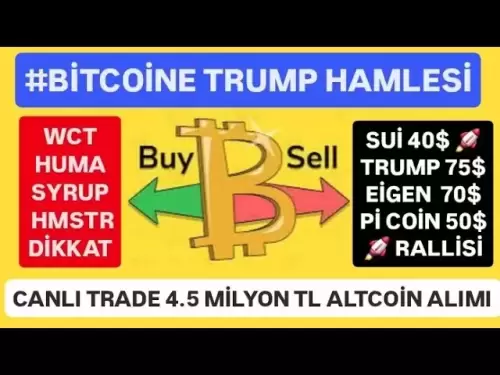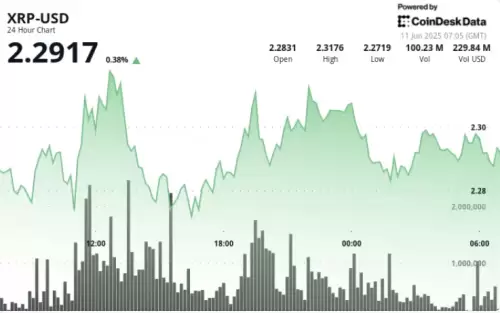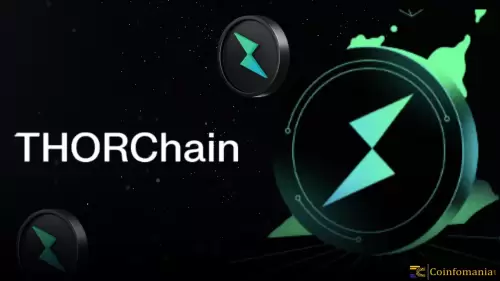 |
|
 |
|
 |
|
 |
|
 |
|
 |
|
 |
|
 |
|
 |
|
 |
|
 |
|
 |
|
 |
|
 |
|
 |
|
Nachrichtenartikel zu Kryptowährungen
DeepBook: Bringing Order Book Trading to Sui
May 02, 2025 at 04:04 pm

The speed and transaction fees of order book trading are finally reaching the levels they need to be used en masse on-chain. They were designed to deliver a central limit order book with nearly instant matching and settlement costs of a penny or less. But achieving both in a decentralized and gasless environment seemed impossible with smart contracts.
Yet, thanks to the combination of Sui’s parallel execution with an optimized matching engine, DeepBook is poised to bring exchange-grade pricing to the deep liquidity pools of DeFi protocols. Let’s look deeper at what DeepBook is, how it works within the sui ecosystem, how DEEP fits into the picture, and what benefits it can bring to your portfolio.
What is DeepBook on Sui?
DeepBook is an on-chain order-matching protocol. It's designed to serve as a native liquidity layer on the high-performance Sui blockchain.
Unlike decentralized exchanges and automated-market-maker DEXs, the DeepBook protocol uses a more traditional central limit order book (CLOB), which helps create tighter spreads and more familiar trading mechanics. Orders are stored as objects on Sui, which means they benefit from the blockchain’s parallel execution model, which has low latency and is often sub-second to finality.
Because DeepBook is embedded at the network level, wallets, aggregators, and DeFi protocols can plug directly into its order books, sharing deep liquidity instead of fragmenting it across siloed pools. This architecture positions DeepBook as a foundational service, much like Uniswap on Ethereum, giving Sui developers a readily available exchange engine without needing to rebuild core matching logic.
Benefits of DeepBook
* Superior price discovery: Deep integration with the Sui blockchain enables efficient price aggregation for optimal trading strategies.
* Parallel execution and low latency: Sui’s architecture and DeepBook’s optimization ensure rapid order matching and swift trade execution.
* Persistent order book: Ensures seamless trading experiences without the need to close and reopen positions.
* Deep liquidity from day one: Critical for generating sufficient trading volume to bootstrap the broader ecosystem.
* Minimal transaction fees: Enables efficient and cost-effective trading for all participants.
How does DeepBook work?
DeepBook is an on-chain central limit order book that lives natively on Sui. Instead of the constant-product curve used by automated market makers, it matches discrete bids and asks just like a traditional exchange, so traders get price-time priority and deterministic execution.
Two mechanisms keep liquidity deep and spreads tight. The first is that everyone starts at a standard fee, but if a taker stakes the minimum DEEP tokens in a pool and then trades past a volume threshold within the epoch, their marginal fee is automatically halved. Active flow, therefore, migrates to DeepBook because the costs fall the more you trade.
Next, makers who stake DEEP then earn proportionate token rebates that increase when a pool’s aggregate liquidity is low and decrease as liquidity improves. This creates a counter-cyclical curve, encouraging liquidity during quiet periods and preventing excessive payouts when books are already healthy.
Both of these perks hinge on stake-based participation, and without the minimum DEEP deposit, a wallet pays full taker fees and receives no maker rewards, aligning incentives between serious liquidity providers and the protocol. At the epoch’s end, any fees not recycled as maker incentives are permanently burned, so wash-trading becomes uneconomical and the token stays deflationary.
Finally, stakers govern the fee bands and staking thresholds for each pool with concave voting rights, which give smaller holders more weight and smaller holders and prevent whales from extracting monopoly rents. In practice, this unique blend of fee discounts, adaptive rebates, stake-gated access, fee burn, and pool-level governance orchestrates a self-balancing marketplace where professional market makers, DeFi protocols, and high-frequency traders can all access wholesale liquidity without centralization.
DeepBook Ecosystem
Several protocols are already integrating with DeepBook to offer diverse trading experiences. For example:
* Aftermath Finance is building an all-in-one hub for yield optimization, borrowing, lending, and covered calls.
* KriyaDEX is combining AMM+limit orders, while Cetus is deploying a concentrated-liquidity DEX.
* FlowX is developing a professional-grade trading portal, Hop is focused on cross-chain aggregation, and Turbos is aiming for a hyper-efficient DEX.
* 7K Aggregator is building an advanced route optimizer.
These protocols will plug directly into the shared DeepBook order book, which is being launched in parallel with the standard Uniswap-style AMMs. Together, they will offer the liquidity and trading options needed to power a new wave of DeFi on Sui.
Deep Book Token (DEEP)
DEEP token is the native token for the DeepBook protocol and fuels the economic layer. It powers the efficient routing of liquidity on-chain, forming the foundation for a vibrant and sustainable decentralized trading ecosystem.
Haftungsausschluss:info@kdj.com
Die bereitgestellten Informationen stellen keine Handelsberatung dar. kdj.com übernimmt keine Verantwortung für Investitionen, die auf der Grundlage der in diesem Artikel bereitgestellten Informationen getätigt werden. Kryptowährungen sind sehr volatil und es wird dringend empfohlen, nach gründlicher Recherche mit Vorsicht zu investieren!
Wenn Sie glauben, dass der auf dieser Website verwendete Inhalt Ihr Urheberrecht verletzt, kontaktieren Sie uns bitte umgehend (info@kdj.com) und wir werden ihn umgehend löschen.
-

- Die Anleger im Sommer im Sommer, insbesondere im Juni, im Auge, da die SEC ihre Entscheidung über Crypto ETF treffen wird
- Jun 11, 2025 at 06:05 pm
- Die SEC hat den Polkadot ETF erneut verzögert, dessen Entscheidung am 11. Juni fällig war. Der Beamte hat mehr Zeit gebeten, um Investor -Kommentare zu sammeln und den Vorschlag weiter zu überprüfen.
-

- Hyperliquid (Hype) ist mit über 42 US-Dollar zu einem neuen Allzeitschließ
- Jun 11, 2025 at 06:00 pm
- Am 10. Juni 2025 stieg der Hype (Hype) um über 8%und führte seinen Preis auf einen neuen Rekord von 42,07 USD. Die Rallye erweiterte ihre Gewinne vom Tag zuvor und markierte eine scharfe Umkehrung gegenüber dem Dip der letzten Woche, der das Token in der Nähe des 30 -Dollar -Levels brachte.
-

-

-

- Geodnet revolutioniert die Geospatial-Industrie in Indien, indem er Echtzeit-, kostengünstige und hoch genaue Standortdaten bereitstellt
- Jun 11, 2025 at 05:56 pm
- Geodnet wurde von Mike Horton gegründet und revolutioniert die Geospatial-Industrie, indem sie Echtzeit-, kostengünstige und hochkarätige Standortdaten über ein dezentrales Netzwerk bereitstellen.
-

-

- XRP zeigt Resilienz inmitten der Marktvolatilität, starke Kaufinteresse treten auf wichtigen Support -Ebenen auf
- Jun 11, 2025 at 05:50 pm
- Das digitale Vermögenswert zeigte die Belastbarkeit inmitten einer breiteren Marktvolatilität, wobei ein starkes Kaufinteresse auf wichtigen Support -Niveaus auftrat.
-

-




























































